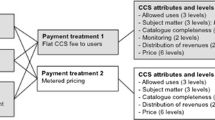Abstract
Although downloading music through unapproved channels is illegal, statistics indicate that it is widespread. The following study examines the attitudes and perceptions of college students that are potentially engaged in music downloading. The methodology includes a content analysis of the recommendations written to answer an ethical vignette. The vignette presented the case of a subject who faces the dilemma of whether or not to download music illegally. Analyses of the final reports indicate that there is a vast and inconsistent array of actions and underlying feelings toward digital music downloading. The findings reveal inconsistencies between participants’ recommendations (what the subject should do) and their attitudes and opinions on the matter (what they would do in a similar situation). These inconsistencies support the notion that as technology evolves, it creates discrepancies between the way things are and the way the law expects them to be, leaving society in a muddle, trying to reconcile the two. What remains to be seen is whether the discrepancy in the case of music downloading becomes extreme enough that the law changes to accommodate an increasingly prevalent behavior, or whether new business models will emerge to bridge the gap between legality and reality.
Similar content being viewed by others
References
American Heritage Dictionary. (1982). Boston: Houghton Mifflin Company.
Becker, J. U., & Clement, M. (2006). Dynamics of illegal participation in peer-to-peer networks—why do people illegally share media files? Journal of Media Economics, 19(1), 7–32.
Benbunan-Fich, R. (1998). Guidelines for using case scenarios to teach computer ethics. ACM SIGCAS Computers and Society, 28(3), 20–24.
Bishop, J. (2004). Who are the pirates? The politics of piracy, poverty, and greed in a globalized music market. Popular Music and Society, 27(1), 101–106.
Bockstedt, J., Kauffman, R. J., & Riggins, F. J. (2005). The move to artist-led online music distribution: Explaining structural changes in the digital music market. In Proceedings of the 38th Annual Hawaii International Conference on System Sciences, Waikoloa, Hawaii.
Chiou, J.-S., Huang, G.-Y., & Lee, H.-H. (2005). The antecedents of music piracy attitudes and intentions. Journal of Business Ethics, 57(2), 161–174.
Dubosson-Torbay, M., Pigneur, Y., & Usunier, J.-C. (2004). Business models for music distribution after the P2P revolution. In Proceedings of the Fourth International Conference on Web Delivering of Music, Barcelona, Spain.
Gopal, R. D., Bhattacharjee, S., & Sanders, G. L. (2006). Do artists benefit from online music sharing? The Journal of Business, 79(3), 1503–1533.
Gopal, R. D., Sanders, G. L., Bhattacharjee, S., Agrawal, M., & Wagner, S. (2004). A behavioral model of digital music piracy. Journal of Organizational Computing and Electronic Commerce, 14(2), 89–105.
Hannon, B. (2008, August 2). The sound of change: Technology and artist independence could alter the music industry. McClatchy—Tribune Business News, Washington.
Hill, C. W. L. (2007). Digital piracy: Causes, consequences, and strategic responses. Asia Pacific Journal of Management, 24(1), 9–25.
Huang, C.-Y. (2005). File sharing as a form of music consumption. International Journal of Electronic Commerce, 9(4), 37–55.
Kallman, E. A., & Grillo, J. P. (1996). Ethical decision making and information technology: An introduction with cases. New York: McGraw Hill.
LaRose, R., & Kim, J. (2007). Share, steal, or buy? A social cognitive perspective of music downloading. Cyberpsychology & Behavior, 10(2), 267–277.
Laudon, K. C., & Laudon, J. P. (2006). Management information systems. Upper Saddle River, NJ: Prentice Hall.
Levin, A. M., Conway, M., & Rhee, K. (2004). Money for nothing and hits for free: The ethics of downloading music from peer-to-peer web sites. Journal of Marketing Theory and Practice, 12(1), 48–60.
Lysonski, S., & Durvasula, S. (2008). Digital piracy of MP3s: Consumer and ethical predispositions. Journal of Consumer Marketing, 25(3), 167–178.
Pew Internet Report. (2005). Music and video downloading moves beyond P2P, 23 March 2005. Available from http://www.pewinternet.org/PPF/r/153/report_display.asp.
Premkumar, G. P. (2003). Alternate distribution strategies for digital music. Communications of the ACM, 46(9), 89–95.
Rayner, B. (2008). Bands find gold mine in concerts. The Toronto Star, 21 February 2008. Available from http://www.thestar.com/entertainment/WhatsOn/article/305417.
Siegfried, R. M. (2004). Student attitudes on software piracy and related issues of computer ethics. Ethics and Information Technology, 6(4), 215–222.
Walker, R. (2003). Turn on. Tune in. Download. New York Times Magazine, p. 15.
Wu, W.-Y., & Sukoco, B. M. (2007). The influence of internet on music market—a revisited. In Proceedings of the 13th Asia Pacific Management Conference, Melbourne, Australia.
Zernike, K. (2003, September). Students shall not download. Yeah, sure. New York Times, p. A6.
Acknowledgments
This research was funded in part by a PSC-CUNY grant #67792-00-36 and a Doctoral Student Research Grant from the CUNY Graduate Center. The authors gratefully acknowledge the capable research assistance of Robert Palermo of Iona College.
Author information
Authors and Affiliations
Corresponding author
Rights and permissions
About this article
Cite this article
Altschuller, S., Benbunan-Fich, R. Is music downloading the new prohibition? What students reveal through an ethical dilemma. Ethics Inf Technol 11, 49–56 (2009). https://doi.org/10.1007/s10676-008-9179-1
Received:
Accepted:
Published:
Issue Date:
DOI: https://doi.org/10.1007/s10676-008-9179-1




